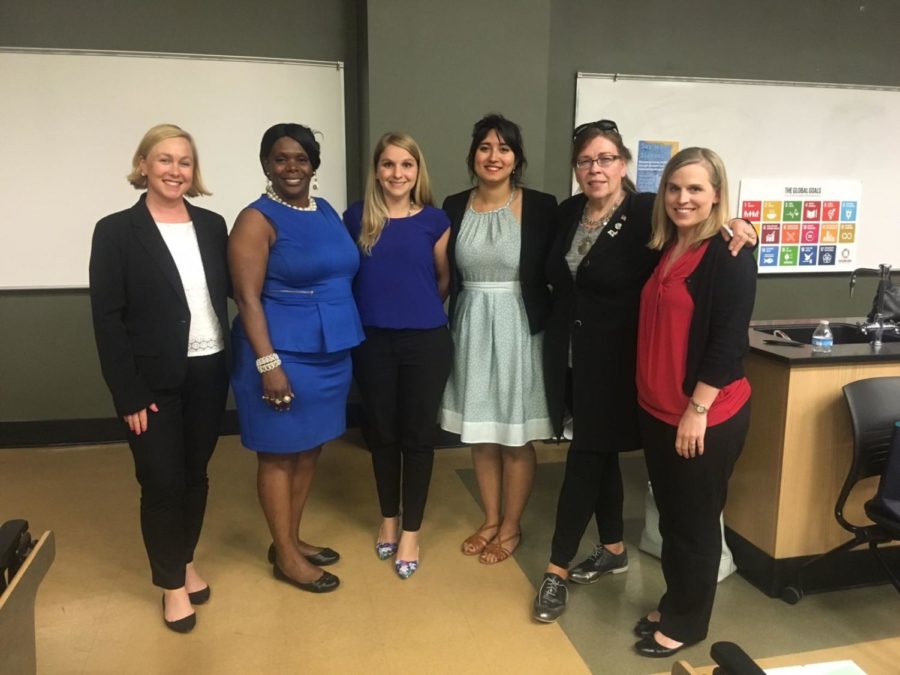Human trafficking panel informs UK students about the issue abroad and in the state
From left to right, Gretchen Hunt, Angela Renfro, Robyn Diez d’Aux, Racha Haffar and Regan Lookadoo were on the human trafficking panel.
April 29, 2016
Many may not realize just how prevalent human trafficking is around the world, let alone in the United States, but the United Nations Association is trying to get word out about the problem that plagues our country.
On Thursday evening, five panel members met at the Funkhouser Building for a lecture titled “Say What? Say Slavery” to discuss the reality of human trafficking and how students at UK can help advocate for victims of these terrible tragedies.
The five panelists included extremely prominent women such as Robyn Diez d’ Aux, a member of the organization called Catholic Charities, Gretchen Hunt, The director of the state attorney general’s Office of Victim Advocacy, Regan Lookadoo, an associate professor at Georgetown College, Angela Renfro, the executive director of Kristy Love, and Jeanette Westbrook, a human rights activist. These women are all professionals in their fields and are passionate about getting out awareness about this problem.
Racha Haffar, a Fulbright teaching assistant at UK, understands how important it is to inform the community about human trafficking not only because she is a part of this community, but also because she herself was almost a victim of human trafficking.
Throughout the entire discussion, the panel members talked about their personal experiences. One panel member, Renfro has created her own foundation, Kristy Love, that is a service in which she opens her arms to survivors. She houses many women in the Louisville area and ensures that they get the medical attention that they need as well as the love and support that need to recover from the trauma of their past. Throughout the discussion, Renfro said that these victims did not have the confident to stand up for themselves.
“You will always be a hoe,” said Renfro when describing how the women think about themselves even after they take shelter through her foundation.
One of the major themes of the discussion was explaining how students and professionals alike could advocate for change for the lives of these individuals who have been victims of human trafficking. Lookadoo is currently teaching a class to inform her students of modern slavery and human trafficking. In this class, the students volunteer at an organization called, “Refuge for Women.” The purpose of these trips are for the students to not only learn about human trafficking but to learn the stories so that they can help advocate against human trafficking.
Lookadoo also is starting a program in Scott County to attempt to educate middle schoolers about the dangers and real life occurrences of human trafficking. She admitted that this was difficult because of the age of the children and the rules against using language that depicting sex. While that this program has been difficult to organize, she believes that it will have a great impact on the future generations.
There was also a discussion from Diez d’ Aux about Catholic Charities, an organization which teaches trained professionals how to identify victims in addition to other causes. She said that police officers and health care providers are important professionals for identifying victims because they are typically one of the few people that come into contact with victims. While these professionals are trained to see signs of trafficking, many everyday individuals could use the same cues to check for human trafficking such as branding tattoos or injuries from work that seem to be extremely unlikely.
Students in attendance of the discussion were also motivated to become more active in their advocacy of human trafficking. Alexicia Perales, an anthropology freshman had no idea about the prevalence of human trafficking in Kentucky.
“This discussion was close to my life because I could have been a victim of human trafficking. It has greatly inspired me to advocate more,” Perales said.
The discussion was organized by the United Nations Associations Foundation with the help of Amnesty International. The hope was that the discussion would encourage students at UK to be motivated to spread the word about human trafficking. While it is widely unknown, Kentucky is a prominent area for human trafficking because of its location and proximity to many highways that lead across the country.
While human trafficking may not be a topic that is easy to talk about, it is something that the many are passionate about, and with the help of students at UK, many changes could be made to help more victims.
































































































































































